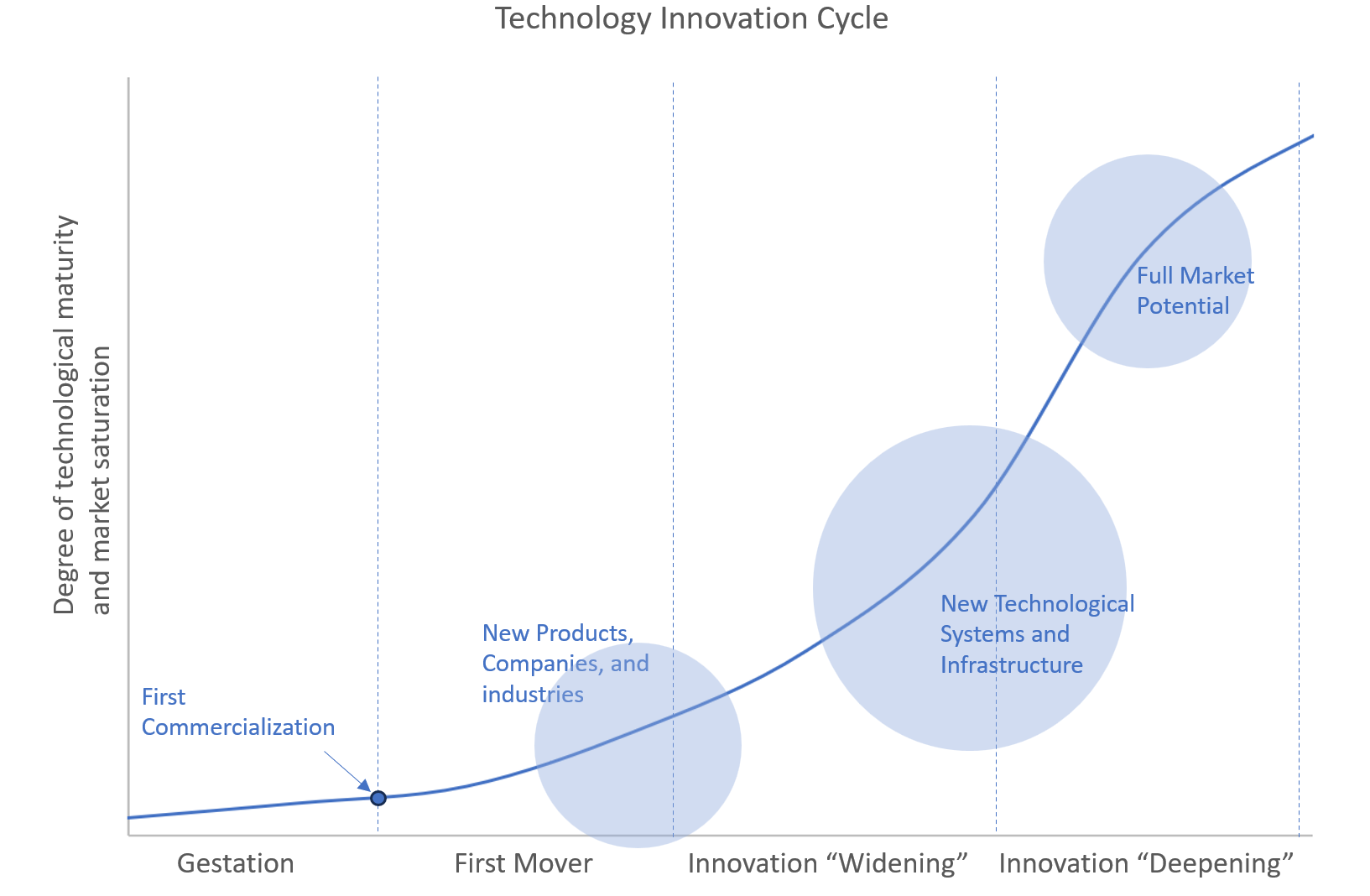The Future Battle for Dominance in the AI Technology Market
In this blog post, we’ll discuss how blocking patents will play an important role in the battle for dominance in the AI technology market.
AI Technological Cycle
Past technological innovation cycles follow a similar pattern. See the chart[1] below:

In our prior blog post (AI Innovations will Lead to a Tsunami of IP Rights – GenerativeIQ®), we explained how ChatGPT provided one of the first commercialization’s of generative AI. In the year or so that followed the release of ChatGPT, first movers made use of the technology (e.g. ChatGPT, other LLMs) by experimenting with use cases, determining the limitations of the technology (e.g. hallucinations), the costs and its potential scale. The race to innovate every level of the AI stack has begun, the “AI Innovation Phase,” to make the technology more useable, reliable, efficient and scalable. AI innovations will provide AI companies with product differentiation and longer term, durable barriers to entry in the form of IP rights. During this phase, IP rights will provide early-stage AI companies with IP currency to help them leverage valuations, transactions, loans, and more.
Battle for Market Dominance
As the innovation curve matures to a decelerating or flattening out curve, established AI companies will begin getting rolled up with others, eventually leading to a market play for dominance. Many of these roll-ups will be for the products, people and/or IP rights that could create more formidable barriers to entry. As in prior technological cycles, IP rights, especially patents, will play a decisive role in helping to sort out who the dominant players will end up being.
Smartphone Wars
There are many prior examples of maturing markets becoming patent litigation battlegrounds. The most significant recent example involved the “Smartphone Patent Wars”, among various phone manufacturers including Apple and Samsung. These companies fought over various patent disputes for 7 years. Since neither company owned blocking patent rights to cell phone technology, these wars didn’t end up blocking a competitor, leaving only one dominant smart phone provider.
Lessons Learned – Blocking Patents
There were lessons learned from the Smart Phone Wars. Apple thought it was obtaining important patent rights, but they turned out to be narrower than expected. Going forward, companies are far more sophisticated about how to invest and obtain blocking patent rights. The sheer number of patents owned by an entity is not as significant as owning a just few blocking patents. In fact, a worldwide litigation finance industry has sprung up that stands ready and willing to finance blocking patents in litigation. The more formative the blocking rights the more interesting and competitive the finance bidding becomes between banks. Entities that own these blocking rights no longer need to pay out of pocket legal fees and bear all the risk in patent litigation. Law firms, banks and/or individuals are willing to finance patent litigation, especially for valuable patents.
AI Patent Wars
Blocking patents are a key ingredient to company success – they provide monetization leverage for transactions in mergers and acquisitions, joint ventures or the outright sale of the product or the company, throughout the entire technological cycle. AI companies that have an eye toward the end game (play for dominance) will be especially focused on how to possess the most important blocking rights necessary (not the sheer number of patents) to withstand and succeed in the future AI patent wars to come.
Having a well thought through patent strategy requires a deep understanding of the subject matter of the AI technology and the business, as well as vast experiences with patent litigation and license transactions to be able to identify and obtain the most effective patents for these purposes.
[1] World Intellectual Property Organization (WIPO) Report 2022, The Direction of Innovation pgs. 25 – 27.


